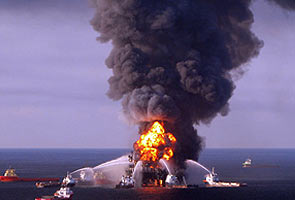
The petition comes less than 12 months after a rig BP had leased there exploded, causing a huge oil spill and killing 11 workers. The accident tarnished BP's image and raised questions about its safety procedures.
Just last week, the Justice Department confirmed that it was considering a range of civil and criminal penalties against BP, including potential manslaughter charges for the deaths of the rig workers, as part of its ongoing investigation into the accident.
At the same time, President Obama, in a major statement on energy policy last week, said the administrations was seeking to reduce dependence on imported oil in part by increasing domestic production, both onshore and off. BP was one of the major producers in the gulf before the accident.
BP is seeking permission to continue drilling at 10 existing deepwater production and development wells in the region in July in exchange for adhering to stricter safety and supervisory rules, said one of the officials. An agreement could be reached within the next month but would not include new drilling, the official said.
The other official said, "We're making progress but it's not a yes yet." Both people spoke on the condition of anonymity because talks on a possible agreement were continuing.
Drilling in the Gulf of Mexico was halted last summer as a result of the accident involving BP's Macondo well, which spilled 4.9 million barrels of oil into the ocean. The ban was lifted in October.
Melissa Schwartz, a spokeswoman for the Bureau of Ocean Energy Management, Regulation and Enforcement, the federal agency that overseas the development of resources in the gulf, said on Sunday that there was no deal with BP. Toby Odone, a spokesman for BP, declined to comment.
The regulator had recently started to permit some deepwater drilling in the Gulf of Mexico. Royal Dutch Shell won approval on Wednesday to drill off the coast of Louisiana on the condition that rigorous new safety standards were met. Other companies that have been allowed to continue drilling in the region include Exxon Mobil, Chevron and BHP Billiton.
Federal officials have said any company that wants to resume drilling in the gulf would have to meet the new safety requirements.
But granting permission to BP would be more controversial because the British oil company is still paying for costs related to the oil spill, the cleanup and the continuing civil and criminal investigations into the accident. BP so far has set aside more than $40 billion to cover those costs.
The administration has pressed BP to ensure that victims of the spill are compensated, but the company has said publicly it needs to resume drilling in the gulf in order to have the financial resources to pay the claims submitted by federal and state officials, and individuals and businesses.
The Obama administration has spent 11 months dealing with the aftermath of the Macondo well blowout and writing new rules to try to prevent similar accidents.
Allowing BP to resume operations in the gulf would send a mixed message -- that even as the administration was trying to increase the safety of offshore drilling and punish bad actors, it was responding to critics in Congress and the oil industry who say the administration is choking off production and driving up energy prices.
What seems clear is that the gulf will not return to full production until all the major players are allowed to resume drilling.
BP is eager for that to happen, and its chief executive, Robert Dudley, has repeatedly said the company remains committed to its operations in the United States. Mr. Dudley has pledged to make improving BP's safety record his priority. He set up a new division last year to monitor safety and suspended some operations in Alaska and the North Sea after the projects failed to meet the new standards.
Gaining permission to resume drilling in the gulf would help Mr. Dudley to move BP beyond its painful and expensive recent history in the region, which has eroded shareholder trust. It would also give BP a boost of confidence.
The British oil company suffered a setback in its expansion strategy last month when a Swedish court blocked a $10 billion cooperation agreement with Rosneft of Russia, which was supposed to give the company access to the Arctic.
The drilling ban had cost oil companies tens of millions of dollars as they were required to keep rigs warm and ready to drill. The Obama administration lifted the drilling ban early but said that companies must meet the new safety standards before they could resume drilling.
They include new standards for well design, casing and cementing. Companies would also require verification from a third party that safety devices like blowout preventers, which failed during the BP spill, were properly designed and tested.
Some environmental groups had criticized the decision, saying it was too early to grant drilling permits again while details of the accident were still being investigated.


No comments:
Post a Comment